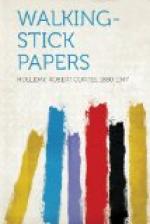To return. The business office exerts not a direct but a moral influence, so to put it, upon the literary department. Business tact must be recognised. A hostile review already in type and in the plan of the next issue may be “killed” when a large “ad” announcing books brought out by the publisher of this one so treated comes in for the next paper; and then search is made for a book from the same publisher which may be favourably reviewed. Or a hostile review may be held over until a time more politic for its release, say following several enthusiastic reviews. And there is no sense in noticing in one issue a disproportionate number of books published by one house.
In concluding my discussion I will draw two portraits of professional reviewers, one composite of a class, the other a picture of a man who stands at the top of his profession.
Seated at his desk is a little man with a pointed beard and a large bald spot on top of his head. This man has been all his life a literary hack. He has read manuscript for publishing houses; he has novelised popular plays for ha-penny papers, and dramatised trashy novels for cheap producers; he has done routine chore writing in magazine offices, made translations for pirate publishers, and picked up an odd sum now and then by a “Sunday story.” He has always been an anonymous writer. He has never had sufficient intellectual character to do anything well. The downward side of middle age finds him afflicted with various physical ailments, entirely dependent upon a precarious position at a moderate salary, without influential friends, completely disillusioned, with a mediocre mind now much fagged, devoid of high ambition, and with a most unstimulating prospect before him. His attitude toward the business of book reviewing is that he wishes he had gone into the tailor business or that his father had left him a grocery store. He would not have succeeded, however, as either a tailor or a grocer, as he has even less business than literary ability. Farther, he regards himself as a gentleman, and books strike him as being more gentlemanly than trade. He has got along as well as he has, by bluff about his extensive acquaintance with literature, and his long experience in writing and publishing.
This type of reviewing man says that he does the thing “mechanically.” About the new crop of juvenile books, let us say, he says the same thing again now that he said four years ago. “One idea every other paragraph,” is his principle, and he thinks it sufficient in a review. Sufficient, that is, to “get by.” And whatever gets by, in his view, “pleases them just as well as anything else.” Our friend of this character has a considerable number of stock remarks which may at any time be written very rapidly. One of these sentences is: “This book furnishes capital reading;” another says that this book “is welcome;” and he holds as a general principle that, “the reviewer who reads the book is lost.”




